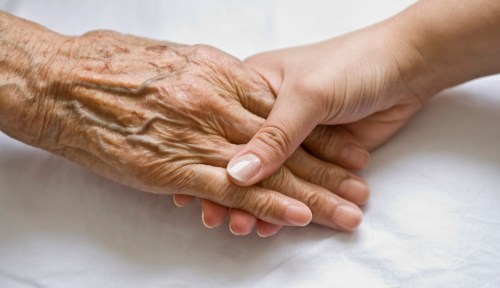The elusive nature of time can be difficult to come to terms with, let alone fully comprehend. Intangible and inevitable, the concept of time is perfectly captured by sand trapped in hourglasses: As the rendition of “Slipping Through My Fingers” in Mamma Mia! suggests, each passing second slips through our fingers, despite our best efforts to hold onto life’s most precious moments. For some people, the inevitable passage of time is so daunting that it elicits a tremendous fear of time itself—such is the case for people diagnosed with chronophobia.
Experts in This Article
clinical associate professor of psychiatry at New York Presbyterian Hospital
licensed clinical psychologist, podcaster, and founder and director of the Kentucky Center for Anxiety and Related Disorders
neuropsychologist and founder of Comprehend the Mind
Getting older is a universal experience, but while many people struggle to accept how little time they have left on this green Earth, chronophobic people experience an all-consuming, life-pausing fear of time passing. Below, psychologists break down chronophobia, including the associated symptoms and treatment methods, to help you figure out whether you may be dealing with this phobia and how to handle it, if so.
What is chronophobia?
Chronophobia is a persistent fear of the passage of time. Like somniphobia, cherophobia, and scopophobia, chronophobia is classified as a specific phobia, since it revolves around a distinct fear, according to Gail Saltz, MD, clinical associate professor of psychiatry at NewYork-Presbyterian/Weill Cornell Medical Center. Specific phobias fall under the broader diagnostic umbrella of anxiety disorders and are “either cued by the anticipation, or the presence of a specific object or situation,” says Kevin Chapman, PhD, clinical psychologist and founder of the Kentucky Center for Anxiety and Related Disorders.
What are the symptoms of chronophobia?
While the triggers and causes of chronophobia will vary from person to person, says Dr. Saltz, there are some common psychological and physical symptoms that people diagnosed with it share. Some mental and emotional symptoms of chronophobia may include:
- Obsessive thoughts about how quickly or slowly time moves, or how little time a person has left to live
- Extreme anxiety about the passage of time
- Avoidance of or dread leading up to events like birthdays or anniversaries
Since chronophobia is an anxiety disorder, it shares many symptoms found in separate anxiety diagnoses. In addition to the above symptoms, Dr. Saltz says that some people with chronophobia may experience the physiological and physical symptoms of anxiety, “to the degree that is interfering with their ability to function.” As such, some potential physical symptoms of chronophobia include:
- Increased heart rate or palpitations
- Sweating
- Trembling or shaking
- Nausea or stomach discomfort
In order to be diagnosed with chronophobia, Dr. Saltz says the fear must meet certain criteria outlined by the Diagnostic and Statistical Manual of Mental Disorders (DSM-5), a tool that medical professionals consult to make mental health diagnoses. To be considered a phobia, the fear must be present for at least six months, be persistent and out of proportion to the actual danger, and significantly interfere with the patient’s quality of life or daily functions, says Dr. Saltz.
What is an example of chronophobia?
An example of chronophobia could be a parent who’s afraid of how little time they have left with their children before they graduate from high school and leave home, or someone who knows they have a much smaller amount of time left to be alive, like someone who is diagnosed with a terminal illness or the elderly. On the flip side, someone could fear how long time stretches on, says Dr. Saltz; such is the case for people with chronic, untreated pain, or people incarcerated with lengthy prison sentences. “It may be anything that reminds them in any way of mortality,” says Dr. Saltz.
What triggers chronophobia will vary greatly depending on the person, she adds. It may be more difficult for people with chronophobia to celebrate certain momentous events and occasions, like weddings or anniversaries, since they serve as a reminder of time’s passing. People with chronophobia may feel sad around their birthday or feel sad at New Year’s for similar reasons.
Chronophobia vs. Gerascophobia vs. Thanatophobia
Chronophobia, gerascophobia, and thanatophobia are all specific phobias that revolve around time, but each is a distinct and separate diagnosis with unique triggers.
To refresh, chronophobia is a fear of the passage of time. The source of fear for chronophobic individuals is the nature of time itself; people with chronophobia fear either how quickly or slowly it seems to pass, or how much limited time they have to achieve certain milestones.
Gerascophobia1, on the other hand, is a fear of aging or growing up. Folks with gerascophobia are often afraid of the physical and mental implications of getting older, like visible signs of aging, bodily changes, and a loss of autonomy. A chronophobic person, on the other hand, may not fear aging at all; in fact, they may actually be optimistic about aging. The source of *their* fear is the limited nature of time, not getting older.
Finally, thanatophobia is the fear of death and dying. Thanatophobic individuals are specifically afraid of the end of life and the inevitability of it, rather than aging processes or the actual passage of time ahead of death.
What causes chronophobia?
Chronophobia can be caused by a multitude of factors. Dr. Chapman says that all specific phobias typically form via three primary pathways: observational learning, past trauma, and information transmission.
The first pathway, observational learning, involves modeling the behaviors of authority figures that you were exposed to as a child. In the case of chronophobia, this could look like having a parent who was overly obsessed with how little time there is available.
According to clinical psychologist Sanam Hafeez, PsyD, phobias like chronophobia can also stem from a traumatic event experienced in childhood. This pathway involves living through a traumatic experience associated with the passage of time, like losing a loved one before they reached old age, or serving a lengthy prison sentence wherein time dragged on.
The last way chronophobia can manifest is through something called information transmission. Information transmission happens when you hear, read, or see something that contains the threat of danger associated with the passage of time. Examples would be reading about a woman who was diagnosed with a late-stage terminal illness and only had a few months left to live or watching a film about the inevitable, inescapable nature of time, like The Curious Case of Benjamin Button.
Research shows that women are more likely to develop a phobia than men2, and that “there’s a genetic predisposition for people who have phobias,” says Dr. Chapman. Current studies suggest that phobias can run in families3, however more research is needed for the medical community to understand the specific gene that causes them.
“If you have a history of certain mental illnesses, you may also develop this specific phobia,” adds Dr. Saltz. People with generalized anxiety disorder, panic disorder, depression, or substance abuse disorder can make a person more likely to develop chronophobia, she says.
Is chronophobia rare?
Unfortunately, the number of people struggling with chronophobia is currently unknown, since no polls or surveys regarding this diagnosis have been published.
However, there is information about how common specific phobias are in general: The National Comorbidity Survey Replication (NCS-R) reports that approximately 12.5 percent of adults in the United States will experience a specific phobia at some time in their lives, which amounts to roughly 40 million people.
Can chronophobia cause insomnia?
Chronophobia may cause insomnia by way of anxiety. The official diagnosis of specific phobias laid out by the DSM-5 does not include an inability or struggle to fall or stay asleep; however, because phobias are anxiety disorders, their symptoms often overlap with those of anxiety, says Dr. Hafeez. Research shows4 that sleep disturbances, including insomnia, are reported to affect roughly 50 percent of people who struggle with anxiety.
How do I manage chronophobia?
Chronophobia can be managed and treated through cognitive behavioral therapy (CBT) and, in some cases, with the assistance of medication. “Not all mental health issues are as responsive to treatment,” says Dr. Saltz, “but specific phobias are highly treatable, which is good news.”
Medication
According to Dr. Hafeez, some patients may benefit from the assistance of medication. In the case of phobias, specific serotonin reuptake inhibitors (SSRIs) or serotonin norepinephrine reuptake inhibitors (SNRIs) can be used to lessen the severity of anxiety in the patient, making it easier for them to go through exposure therapy. “Usually after the treatment is complete, they are at some point able to come off medication,” says Dr. Saltz.
Exposure therapy
In regards to therapy, “specific phobias are known to respond best to what’s called exposure and response prevention,” says Dr. Saltz. Exposure therapy, she explains, is a form of CBT that involves allowing the patient to experience small, gradually increasing doses of the source of their fear until the symptoms lessen and the patient can confront the source of their phobia directly on their own.
Medical professionals can help guide patients through exposure therapy in-office, but people with phobias can also try it at home through systematic desensitization, says Dr. Hafeez. This method involves exposing yourself to your fear in small, measured steps in order to lessen your response to it. Dr. Saltz recommends starting small: First, try sitting still with your eyes closed and simply think about the passage of time or the source of your chronophobia while taking slow, measured breaths. Once you’re able to think about it without feeling overwhelmed by anxiety, try looking at a photo that makes you think about the trigger of your chronophobia, like an old family photo.
When to seek professional help for chronophobia
You should seek help for chronophobia if the mere thought of time passing elicits a strong anxious response within you, says Dr. Saltz. Exposure is an important aspect of treatment for specific phobias, so if you can’t handle exposing yourself to your chronophobic triggers on your own, then the best course of action would be to seek professional help from a therapist.
While chronophobia can certainly be treated, Dr. Saltz says that confronting the chronophobia will likely be more difficult than confronting a more obscure fear whose source is easier to avoid in daily life, like a fear of snakes, or a fear of open water. Therapists can help guide you through exposure therapy in a safe setting, help you dissect the sources of your chronophobia, and challenge any irrational streams of thought about the passage of time you may be holding on to.
Perales-Blum, Laurencia et al. “Severe growing-up phobia, a condition explained in a 14-year-old boy.” Case reports in psychiatry vol. 2014 (2014): 706439. doi:10.1155/2014/706439
↩︎Fredrikson, M et al. “Gender and age differences in the prevalence of specific fears and phobias.” Behaviour research and therapy vol. 34,1 (1996): 33-9. doi:10.1016/0005-7967(95)00048-3
↩︎Steinhausen, Hans-Christoph et al. “Family Aggregation and Risk Factors in Phobic Disorders over Three-Generations in a Nation-Wide Study.” PloS one vol. 11,1 e0146591. 19 Jan. 2016, doi:10.1371/journal.pone.0146591
↩︎Chellappa, Sarah L, and Daniel Aeschbach. “Sleep and anxiety: From mechanisms to interventions.” Sleep medicine reviews vol. 61 (2022): 101583. doi:10.1016/j.smrv.2021.101583
↩︎
Sign Up for Our Daily Newsletter
Get all the latest in wellness, trends, food, fitness, beauty, and more delivered right to your inbox.
Got it, you've been added to our email list.











